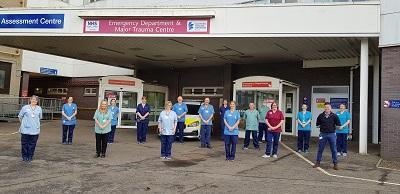
NHS Tayside continues to be the top performing health board for Emergency Department (ED) waiting times in mainland Scotland.
NHS Tayside’s A&E teams are maintaining their position as the best performing mainland Board, despite the double challenges of winter and COVID-19, with the most recent weekly performance against the national four-hour target of 92% at week ending 9 January 2022.
This strong performance is not just due to the efforts of the dedicated staff in the EDs in Perth Royal Infirmary and Ninewells Hospital, it also involves wider multi-disciplinary teams providing urgent access to services right across the organisation including colleagues in out-of-hours, primary care and the Health and Social Care Partnerships and Scottish Ambulance Service. The ED waiting times for Tayside reflect the hard work of teams right across Angus, Dundee and P&K in all aspects of healthcare provision.
Explaining how Tayside EDs work, Co-Clinical Lead in Emergency Medicine, Dr Andrew Kinnon said, “Patients who present at our EDs with minor illness or injury are assessed early by a senior doctor or nurse to ensure that they do not require emergency care before they are redirected to the most appropriate service. This ensures that patients are seen by the best person for their needs and also ensures our specialist staff can see those needing emergency treatment as quickly as possible.
“Prior to the pandemic, around 5-10% of patients attending our ED were redirected to more appropriate services following this assessment.
“NHS Tayside operates a highly effective Flow Navigation Centre (FNC) which is staffed by senior ED clinical decision makers who take up to 35,000 calls a year. The centre takes calls from Scottish Ambulance Service, Perth Royal Infirmary ED, minor injury units and GPs as well as calls to NHS 24 from patients which are routed to the FNC for assessment.
“Clinicians in the FNC can assess patients over the phone or by video call and book them into an appointed time slot at ED. They can also redirect them to another service or give advice for self-management as appropriate.
“In addition, colleagues in Acute Medicine also take direct referrals from paramedics for suitable patients which means they are not admitted to ED but go straight to the Acute Medical Unit at Ninewells.
“All of these measures help us to ensure that patients receive the right care in the right place as quickly as possible and help keep other services in the hospital running smoothly.”
Chief Executive, Professor Grant Archibald said, “NHS Tayside Emergency Departments continue to deliver quality care to our patients even in the busiest of times. This is undoubtedly down to the dedication and hard work of the Emergency Department teams, from clerical, portering, nursing and medical teams and partnership working with colleagues in the Scottish Ambulance Service, NHS 24, Primary Care services and in-hospital medical and nursing teams.
“I would like to commend all the teams involved for the exceptional service they deliver, but also to the people of Tayside for everything they continue to do to support us this winter to keep services running.”
The way people access A&E services has changed to make sure everyone gets the right care in the right place. A&E departments remain open for those who have a life-threatening emergency. However, to ensure patients have the fastest access to the treatment they need, anyone with a non-life threatening condition who would usually go to A&E should now call NHS 24 on 111 first, day or night, to be directed to the right NHS service.
If your condition is life threatening or you need an ambulance, call 999.